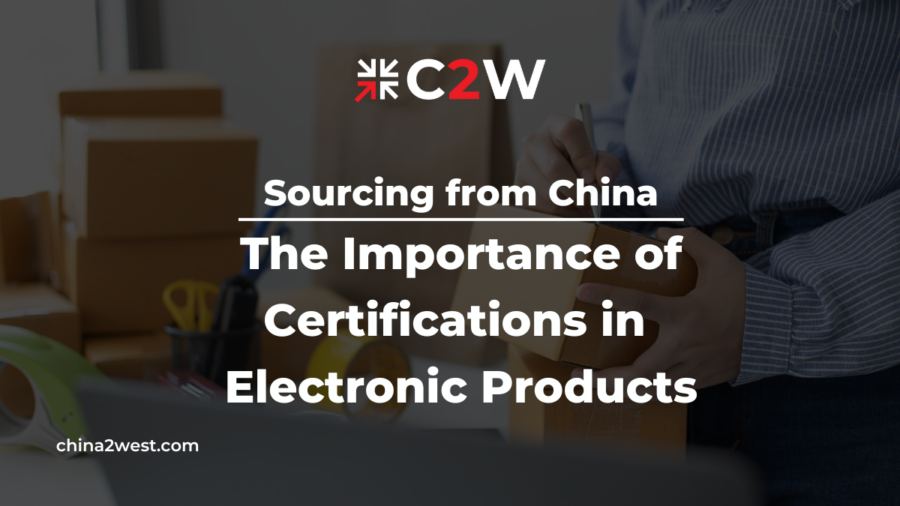In the dynamic and often complex landscape of global trade, sourcing electronic products from China can be a savvy business move. However, success in this endeavor largely depends on understanding and adhering to certain protocols, one of the most critical being certifications. These serve as proof that the products you are procuring meet particular quality and safety standards. This blog post sheds light on the importance of these certifications and offers a comprehensive guide to some common ones you may need to consider.
The Role of Certifications in Electronic Products
Imagine certifications as your shield and sword in the vast market of electronic products. Acting as your shield, they provide an assurance that the products you are sourcing from China have met and passed stringent safety, quality, and performance checks. Like a sword, they slice through the risk of subpar or potentially harmful products reaching your customers. Issued by trusted authorities, certifications serve as an affirmation of product integrity. Beyond merely protecting consumers, certifications also play a crucial role in maintaining your business’s good standing. They significantly reduce the risk of damaging your reputation and help avoid legal complications down the line. Consider certifications not just as a necessity but as a strategic advantage when navigating the marketplace. They are your trusty companions, guiding you towards sourcing decisions that uphold not just quality, but safety and customer satisfaction.
6 Common Electronic Product Certifications
As a buyer, being well-versed with the electronic product certifications allows you to confidently navigate the marketplace, ensuring that your chosen products are not only high in quality, but are also compliant with the necessary regulations in your target markets. Understanding the ins and outs of these certifications can be a game-changer, offering a competitive edge in sourcing and selling electronic products.
CE Marking (Conformité Européene)
Importance: The CE mark indicates that the product complies with European Union (EU) safety standards and regulations. It is mandatory for many electronic products sold in the EU.
Relevance: Ensure that the electronic products you source from China carry the CE mark if you intend to sell them in the European market.
RoHS (Restriction of Hazardous Substances)
Importance: RoHS compliance restricts the use of certain hazardous substances in electronic products, promoting environmental protection and human health.
Relevance: Check if the products adhere to RoHS regulations, especially if you plan to sell them in regions with strict environmental standards.
FCC (Federal Communications Commission)
Importance: The FCC certification is required for electronic products sold in the United States, ensuring electromagnetic compatibility (EMC) and radio frequency (RF) interference compliance.
Relevance: Verify that electronic devices meet FCC standards if you are targeting the U.S. market.
UL (Underwriters Laboratories) Certification
Importance: UL certification indicates that products have been tested for safety and comply with specific safety standards.
Relevance: Many retailers and consumers in North America prefer products with UL certification as it assures safety.
CCC (China Compulsory Certification)
Importance: Mandatory for various product categories in China, CCC ensures that products meet specific safety and quality standards.
Relevance: If your electronic products are intended for the Chinese market, CCC certification is crucial for legal compliance.
ISO Certification (International Organization for Standardization)
Importance: ISO standards cover various aspects, such as quality management, environmental management, and information security, indicating a commitment to quality and efficiency.
Relevance: While not specific to electronic products, ISO certification can enhance the overall credibility of the manufacturer.
Navigating the Certification Process
Acquiring these certifications may initially seem like a daunting task, but with the right guidance and a systematic approach, it becomes much more manageable.
Identifying Certifications
The first step in your journey is identifying the specific certifications required for your individual products. Once these are pinpointed, your next move is seeking out recognized laboratories or certification bodies who can conduct the required product testing and subsequent certification.
Choosing Certification Bodies
The importance of partnering with reputable bodies for this process cannot be overstated, as their credibility will directly influence the legitimacy of your certifications. Each step of the certification process needs to be handled with precision and due diligence, as one slip-up can put your product and brand reputation at risk.
Importance of Reputable Partners
One invaluable resource to consider during this process is the expertise of a seasoned sourcing agent. Their knowledge of the regulatory landscape and certification requirements can greatly simplify the process and ensure all bases are covered. They act as a strategic partner, guiding you through each phase of the certification process, ensuring all procedures are correctly followed, and potential roadblocks are proactively addressed.
Commitment to Quality
Remember, the goal here isn’t just to get your product certified, it’s about maintaining an unwavering commitment to quality, safety, and customer satisfaction. Certifications aren’t just badges to be collected; they’re tangible proof of your dedication to delivering only the best products to your customers. Navigating the certification process is not just about ticking regulatory boxes, it’s about building a brand that resonates with trust and credibility in a highly competitive market. At C2W, we understand the importance of regulations and certifications, and we are here to support you every step of the sourcing journey. Contact us today and let our sourcing experts guide you through the electronic product sourcing process, ensuring that your products meet the highest standards of quality, safety, and customer satisfaction.


